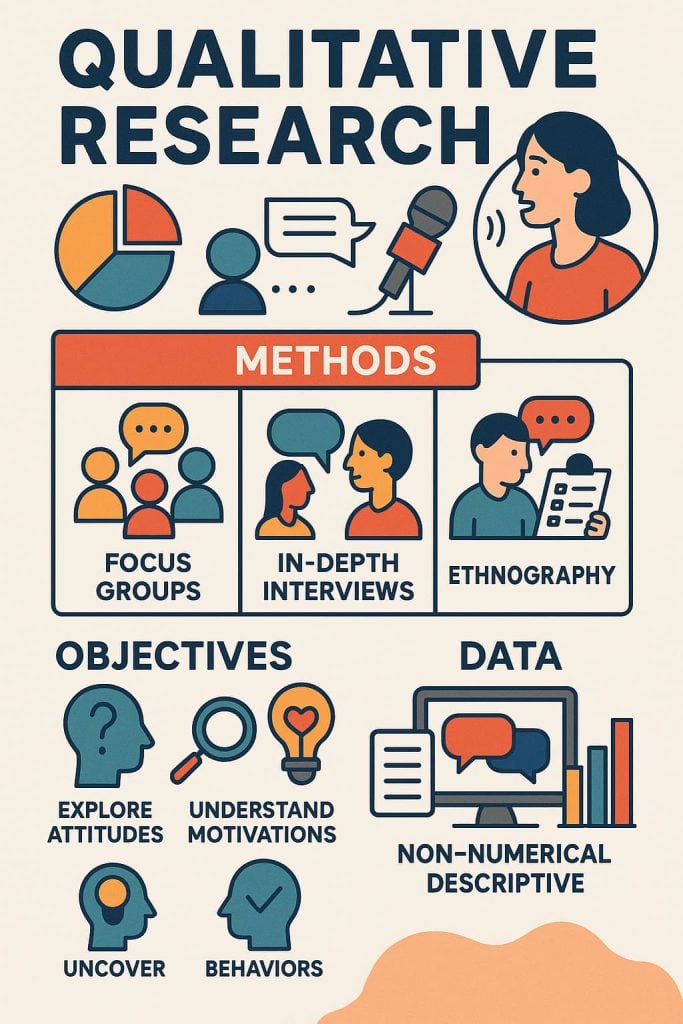Qualitative Research Agency

Most qualitative research agencies are confidence artists who’ve weaponized corporate jargon to disguise their complete inability to understand human behavior beyond the sophistication level of cafeteria lunch surveys.
They promise revelatory consumer insights. Deliver recycled PowerPoint platitudes that sound profound to executives who’ve never actually talked to real customers outside golf club conversations. Charge Fortune 500 prices for amateur-hour psychology performed by people who couldn’t decode authentic human motivation if their lives depended on identifying truth versus performative bullshit.
So, what’s the difference between an outstanding agency and an average one?
Table of Contents
✅ Listen to this PODCAST EPISODE here:
What is Qualitative Research Agency?
A legitimate qualitative research agency functions as a behavioral detective agency specializing in psychological archaeology that quantitative spreadsheet worship cannot excavate.
Psychological espionage with business applications. Human behavior forensics that reveals truths people hide from themselves.
These agencies deploy methodological arsenals—ethnographic infiltration, psychological interrogation techniques, focus group orchestration, observational intelligence gathering, cultural code-breaking, and narrative excavation—to understand the subterranean “why” behind consumer decisions that surface-level surveys miss by astronomical distances.
… But here’s where amateur fraudsters reveal their intellectual nakedness: they confuse research choreography with insight extraction.
Authentic qualitative research agencies don’t simply observe behavior—they decode cultural hieroglyphics. The elite agencies operate like behavioral CIA operatives solving mysteries that Harvard MBA spreadsheets cannot crack with infinite computational power.
Why Qualitative Research Agency Expertise Is Important

Numbers lie constantly with mathematical precision. People lie more creatively but reveal truth accidentally through behavioral inconsistencies that expert observation can decode systematically.
Survey responses transform into corporate fiction when participants provide socially acceptable performance rather than psychologically honest revelation. 市场调查 becomes strategic malpractice when amateur investigators ask leading questions that confirm preexisting biases rather than challenging fundamental assumptions about human nature.
This explains why amateur qualitative research destroys more shareholder value than terrorist attacks.
- A professional qualitative research agency’s expertise prevents catastrophic misunderstandings of market psychology, which can lead to product failures costing hundreds of millions, marketing disasters that permanently damage brand equity, and strategic decisions based on fictional consumer insights that sound plausible to executives who have never studied human behavior beyond casual observation.
- Expert agencies understand the cognitive biases that contaminate amateur research, much like intellectual viruses. They consistently recognize cultural contexts that amateur researchers miss. They also deploy methodological safeguards that prevent data corruption through researcher influence or participant performance anxiety.
- Top qualitative research agencies translate human psychological insights into business strategy rather than academic observations that sound intellectually impressive but provide zero actionable intelligence for executives who need decisions tomorrow, not theoretical frameworks for graduate student dissertations.
Table 1. Qualitative Research Industry Intelligence 2025
| 类别 | Key Metric | Value/Data | 来源 |
|---|---|---|---|
| 🌍 GLOBAL MARKET LANDSCAPE | |||
| 市场规模 | Global Market Research Industry Revenue (2024) | $140 billion ↗ 7.7% growth | Backlinko Research Statistics |
| US Market Leadership | US Market Research Revenue Share | $48 billion 55% global share | ESOMAR via Backlinko |
| Growth Trajectory | 3-Year Industry Growth (2021-2024) | 37.25% ($102B → $140B) | AIMultiple Market Research |
| US Market Size | US Market Research Industry (2025) | $36.6 billion CAGR 3.9% | IBISWorld |
| 🎯 QUALITATIVE RESEARCH DOMINANCE | |||
| 需求不断增长 | Researchers Reporting Increased Qualitative Demand | 57% report growing demand | Qualtrics via Backlinko |
| Remote Research | Qualitative Research Conducted Online/Remotely | 87% of researchers | Qualtrics Survey Data |
| Top Method | Most Used Qualitative Research Method | Online In-Depth Interviews (34%) | Statista Research |
| 焦点小组 | Online Focus Groups with Webcams Usage | 28% regular usage | Statista Research |
| 💰 METHODOLOGY PRICING BENCHMARKS | |||
| 深度访谈 | B2C Individual Interviews (per interview) | €600 ($630) | IntoTheMinds Pricing |
| B2B Interviews | Business Professional Interviews (per interview) | €750 ($790) | IntoTheMinds Pricing |
| 焦点小组 | Standard Focus Group (per group) | $7,000-$20,000+ | Drive Research |
| IDI Pricing | In-Depth Interviews (10-15 interviews) | $5,000-$15,000 | Drive Research |
| Project Range | Average Market Research Project Cost | €8,000-€12,000 | IntoTheMinds Analysis |
| 🤖 TECHNOLOGY & AI TRANSFORMATION | |||
| AI Investment | Organizations Planning AI Investment (2025) | 83% of research professionals | Qualtrics via Backlinko |
| Current AI Usage | Researchers Using AI Regularly | 47% worldwide | Qualtrics Survey |
| Synthetic Data | Researchers Using Synthetic Data (Past Year) | 69% adoption rate | Qualtrics Research |
| Future Projection | Synthetic Data Expected Share (Next 3 Years) | 50%+ of data collection | Greenbook Research |
| 📈 ROI & STRATEGIC VALUE | |||
| ROI Example | Fortune 500 AI Research Project ROI | 58,222% ($225K → $131M value) | SIS International Case Study |
| 客户保留 | American Express Research-Driven Improvement | 400% increase in retention | AIMultiple Research |
| 客户体验 | Marketers Believing CX is Critical for Success | 85% agree on importance | AIMultiple Survey |
| Execution Gap | Marketers Highly Capable in Customer Experience | Only 14% self-assessment | AIMultiple Analysis |
| 🏆 INDUSTRY LEADERSHIP | |||
| Market Leader | Top Market Research Company (2022) | Gartner – $5.48B revenue | Statista via Backlinko |
| Runner-Up | Second-Largest Research Company | IQVIA – $5.43B revenue | Statista Research |
| Business Count | Market Research Businesses in US | 46,241 businesses CAGR 2.4% | IBISWorld |
| 🚀 2025 STRATEGIC TRENDS | |||
| Omnichannel Research | Multi-touchpoint Customer Journey Analysis | Critical Trend Cross-platform insights | Attest Market Trends |
| Voice Recognition | Voice Tech Market Projection (2029) | $50 billion (from $12B in 2022) | Statista via Attest |
| Real-Time Insights | Demand for Immediate Actionable Data | High Priority ROI-driven focus | Greenbook Analysis |
| Hybrid Methodology | Combining Quantitative + Qualitative Approaches | Standard Practice for comprehensive insights | Attest Research |
The Strategic Architecture of Professional Qualitative Research Services
Professional qualitative research agencies operate through methodological sophistication that amateur efforts cannot comprehend (much less replicate successfully).
Amateur efforts cannot comprehend, much less replicate, the sophistication of professional qualitative research agencies.
The breadth of ethnographic research goes beyond the mere observation that a tourist does because watching behavior within social systems permits identifying systematic and entrenched ways of behaving that respondents cannot self-describe. This is because most people don’t possess psychological self-awareness.
Professional qualitative researchers blend into the everyday lifeworlds of the consumers. It includes their homes, workplaces, and social circles, to gather uncontrived, spontaneous reactions. Actually, authentic behavior is different from responses given in research settings that invoke performance anxiety and social desirability bias automatically. This is anthropological espionage performed by behavioral specialists aware of psychological camouflage techniques.
Mastering in-depth interviewing involves techniques that prompt honest answers and not ‘answers to please interviewers’ responses. Any authoritative figure with a discerning capability would identify micro-expression indicators of deception, emotional roadblocks to genuine communication, and crafting spaces of psychological safety where participants may safely discuss vulnerable subjects they would usually defend behind elaborate battle shields.
专门小组 entail control regarding group psychology, stimulating dialogue, as opposed to brand consensus-building exercises, which eliminate dissenting opinions through social pressure. So, untrained facilitators lack the necessary psychological grounding to navigate the intricate social dynamics that arise when strangers discuss their preferences under the gaze of authority figures.
Integrating technology in qualitative research increases the value of insights and helps to meet tighter timelines. For instance, online ethnography, social media behavioral archaeology, mobile diary psychological excavation, and virtual reality testing environments are just a few digital ethnographic techniques in a market full of innovative tools.
Advanced Methodological Approaches and Analytical Frameworks

Cutting-edge qualitative research agencies deploy methodological weaponry that separates professional intelligence operations from amateur opinion polling conducted by well-meaning incompetents.
People think in stories. Professional agencies understand this fundamental psychological reality while amateur researchers remain trapped in rational economic frameworks that explain nothing about actual human behavior.
For this reason, semiotics researchers investigate how symbols, images, and patterns invisible to us affect what people buy. Although we are not aware of them, these elements affect our purchases even more than making a list of pros and cons for a product – and this methodology, by letting things proceed naturally, reveals truths that official experiments cannot see because researchers remove the effects of real circumstances.
By creating consumer behavior models using real psychological findings, grounded theory eliminates the possibility of having your theory confirmed by confirmation bias.
It typically provides insights that differ from the expected, enabling our clients to become more competitive, as they are prepared to act on insights that rivals consider impossible or meaningless.
Behavioral economics lessons pay attention to how mental forces influence decisions not explained by traditional economics, though they are real for consumers. Agencies understand that buying behavior is driven by emotions, even when a product’s value is analyzed and calculated by commercial standards.
Research across countries consistently fails because teams often fail to recognize culture as something people naturally experience, unlike academic theories, which are often detached from their psychological aspects.
Figure 1. AI & Technology Adoption in Market Research
来源: Qualtrics Market Research Trends Report
机遇与挑战
Oportunities
和 neuroscience integration, brain activity can be measured as people make buying decisions. This allows for an understanding of the hidden forces that ordinary research cannot detect, as only small parts of our psychology are aware of our actions.
Such knowledge could completely change how marketing effectiveness is measured, showing psychological results instead of social achievements.
Working with AI will enhance human understanding of psychology, and it won’t replace a researcher’s unique insight with an algorithm that cannot grasp people’s emotions. By leveraging insights into habits and trends, predictive modeling can help identify business risks and opportunities that emerge before demographic statistics report shifts in the population.
As a result of continuous consumer engagement, marketers will shift from conducting periodic research to managing relationships and gaining instant, ongoing insight information rather than relying on outdated data. The advice offered by consumer advisory groups. Systems that follow people’s behaviors over time. Forecasting preference from an analysis of behaviors.
挑战
🔹Authenticity verification becomes exponentially more complex as digital interaction increases and genuine human psychological connections are sought. Online personas might not reflect authentic behavioral patterns, and virtual environment responses might not accurately predict real-world psychological reactions.
🔹Privacy regulations evolve faster than research methodologies can adapt to the changing legal frameworks that govern the collection and analysis of psychological data. Research must consider consumer consent requirements, data protection compliance across various jurisdictions, and the diverse international privacy laws.
🔹 Researcher skill requirements are shifting toward hybrid capabilities combining traditional qualitative psychology expertise with technological proficiency, which most experienced researchers lack. The learning curve challenges experienced researchers trained in traditional methodologies who must acquire technological skills rapidly or risk professional obsolescence as industry standards evolve toward hybrid human-technology approaches.
🔹 Market saturation of research requests affects the quality of participants, as consumers receive multiple research invitations, creating professional participant populations that provide performative responses rather than authentic psychological insights.
Market Research Integration into Business Strategy

Most firms engage a qualitative research agency as if they were booking an Uber—complete the job, receive the document, add the company insights to the shelf, and proceed to make decisions based on instinct and flashy slide decks.
On the contrary, top-tier firms leverage partnerships with qualitative research agencies to gain insights that build compounding advantages over time through superior consumer psychology understanding that competitors cannot access or afford.
Figure 2. Most Popular Qualitative Research Methods (2024)
来源: Statista & Qualtrics Research Survey
Strategic Integration Revolution
This is the key differentiator between billion-dollar firms and million-dollar firms: Some of the most strategic moves need to come from the insights generated from consumer psychology instead of financial projections, competitor analysis, or internal corporate guesses.
✔️ Phase 1: Intelligence Architecture
Create and structure an organization with processes systematically routing qualitative research agency insights to strategic decision making for real-time agile responsive actions instead of shelves filled with research reports no one will read.
✔️ Phase 2: Competitive Intelligence Operations
Grow your partnership with a qualitative research agency into a full-blown competitive intelligence network, and it will monitor changes in consumer sentiment, recognize shifts in the market, and forecast industry disruptions long before they become evident through conventional analysis.
✔️ Phase 3: Integration of Innovation Pipeline
Guide the strategic development of innovation using insights from qualitative research agencies to pivot toward genuine consumer necessities instead of patented engineering guesses or rivalry feature replication.
Adaptation Strategy In-Action: Real Time Change Frameworks
Vertical partnerships with qualitative research agencies provide unmatched strategic agility, and this partnership enables them to operate using “agile” strategies that traditional quarterly research approaches cannot match.
Continuous Intelligence Systems:
- Monthly diagnostics of consumer psychology
- High-priority competitive threat response research
- Shifts in culture trend monitoring to forecast
- Identification of innovation opportunities through unmet needs assessment
Strategic Decision Integration:
- Budget allocation informed by consumer insights
- Descriptive guidance for message framing by cultural psychology
- Prioritization of product features guided by behavior
- Strategic Stance determined on Brand Positioning frameworks based on Emotional Judgement
Integration Success Metrics:
Monitor qualitative research agency contributions through the calculation of strategic value impact.
- Marketing insight-driven consumer decision time acceleration.
- Compare strategy achievement rates against attribution-based decisions.
- Duration of the strategic market edge gained from understanding consumers deeply outshines competition.
- Consumer decision sciences utilization rates for innovation success.
- Cultural savvy drives market expansion efficiency.
The ROI Mathematics: How Qualitative Research Agencies Pay for Themselves
定性 research agencies mitigate losses from dire strategies while uncovering business opportunities that internal teams and generic research overlook.
Breakthrough Technology:
A Fortune 500 company spent $225,000 on qualitative research agency services to explore everyday life integration of AI and the accompanying consumer behaviors.
Captured innovation insights include:
– Analysis on cross-demographic acceptance and application of AI based on culture.
– Deep psychological trust frameworks related to technology.
– Emotional motivation behavior for technology utilization.
– Consumers have apprehensions and anticipations concerning technology integration aspects.
Optimized development expenditures include:
– Trust acceleration AI-related acceptance features: $67 million time-to-market advantage.
– Authentic dissociation position eliminates two product repositioning claims: $18 million saved.
– Psychology-guided aesthetics cut 8-month development cycles: $12 million saved.
– Integrated fear response triggers based on avoidance analytics design: total failure of 4 AI components: $34 million avoided costs.
Creation of Value: 131 million
Investment value of 225k for research yielded 131 million after optimization for AI features resulting in 58,222% ROI
Inside the Qualitative Research Toolbox

Key Insights You Can’t Afford to Miss
✅ Expert psychological methodology prevents strategic malpractice – professional qualitative research agencies deploy advanced interviewing techniques, cultural analysis frameworks, and behavioral observation skills that amateur efforts cannot develop regardless of budget allocation or timeline extensions
✅ Human psychological insight transcends data collection theater – authentic agencies extract subconscious motivation patterns, emotional trigger mechanisms, and cultural context influences that quantitative research and amateur qualitative efforts consistently miss through methodological incompetence
✅ Professional competency creates speed advantages – expert agencies compress insight development timelines from months to weeks while improving psychological data quality through methodological expertise that amateur teams cannot acquire rapidly enough for competitive relevance
✅ Technology augments rather than replaces psychological expertise – cutting-edge agencies integrate AI pattern recognition, biometric measurement systems, and digital ethnography platforms to enhance human insight capability rather than substituting algorithmic processing for psychological understanding
✅ Cultural psychological competency prevents international failures – professional agencies understand global consumer behavior variations, regulatory compliance requirements, and cultural adaptation necessities that amateur international research overlooks through methodological ignorance
✅ Business application focus delivers strategic intelligence – expert agencies translate human psychological insights into actionable strategic recommendations rather than academic observations that sound intellectually impressive but provide zero practical implementation guidance for business success
✅ Authenticity verification through psychological sophistication – professional agencies recognize deception indicators, manage social desirability bias mechanisms, and create psychological safety environments that enable authentic sharing about topics participants normally protect through defense mechanisms
✅ Longitudinal psychological relationship management – sustained consumer engagement rather than transactional research relationships provides real-time psychological insight streams that adapt to changing market conditions and evolving consumer psychological patterns
What Makes SIS International a Top Qualitative Research Agency?
SIS 国际 has mastered the excellence of qualitative research agencies through psychological understanding. We have crafted sophisticated methodologies over four decades of evolutionary market innovation, differentiating professional intelligence operations from basic opinion gathering.
- RIGOROUS QUALITY ASSURANCE – Each research project undergoes a thorough validation process that ensures the integrity of the methodology and provides a comprehensive understanding of the actual psychological findings, rather than relying on random sampling.
- CUSTOMIZED APPROACH – Oversimplified research methods overlook nuances and provide insights that are, at best, predictably painful and fail to capitalize on strategic sophistication, wasting resources or opportunities. shareholder value. We design custom frameworks of qualitative research that incorporate the specific business context, culture, audience psychographics, and industry elements that determine success or catastrophic failure.
- THE 40+ YEARS OF EXPERIENCE – Having experienced every possible research blunder, we have constructed preeminent systems that guarantee through-expertise active-decision, not trial-and-error learning too often available to incompetent teams.
- THE GLOBAL DATABASES FOR RECRUITMENT—Our participant databases provide psychodemographic and culturally specific segments, as well as professionals beyond the reach of primary recruitment sources using naive methods that assume universal accessibility.
- PROJECTS GET DONE FAST– Speed without psychological insight quality becomes an expensive strategic failure costing more than research savings justifies. Combining speed with exceptional psychological insight depth transforms them into competitive intelligence weaponry capable of rapid market response.
- ADVANCED TECHNOLOGY INTEGRATION– Each research platform utilizes advanced AI techniques; including pattern recognition, biometric measurement systems, behavioral analytics platforms, and digital ethnography tools. However, we leverage our expert psychological interpretation to prevent replacing emotions with algorithmic processes.
常见问题解答
How do professional qualitative research agencies differ from internal research teams or amateur service providers?
Professional qualitative research agencies possess methodological expertise, psychological training, and cultural competency that internal teams rarely develop due to resource constraints, competing priorities, and lack of specialized education that complex psychological research requires. Expert agencies understand the cognitive biases that systematically contaminate amateur research, recognize deception indicators that untrained researchers consistently miss, and deploy methodological safeguards to prevent data corruption through researcher influence or participant performance anxiety.
What methodologies distinguish expert qualitative research from basic survey research or amateur focus group facilitation?
Expert qualitative research employs sophisticated methodological frameworks including ethnographic psychological observation, phenomenological analysis, narrative exploration, cultural semiotics, and behavioral psychology that basic research approaches cannot access through methodological limitations. These methodologies require specialized psychological training, cultural competency education, and behavioral analysis expertise, which amateur efforts often lack due to inadequate preparation.
How do you ensure psychological authenticity and prevent social desirability bias in sensitive research topics?
Psychological authenticity verification requires advanced interviewing techniques, environmental design expertise, and methodological safeguards that encourage honest communication rather than performative responses to meet perceived researcher expectations or social conformity pressures. We create psychological safety through expert interviewing approaches, deploy indirect questioning techniques, and use observational validation to identify response authenticity indicators that reveal genuine versus performative communication patterns.
Can qualitative research agencies provide psychological insights that quantitative data analysis cannot reveal?
Quantitative research identifies numerical patterns in historical data but cannot explain the psychological, cultural, or emotional drivers that create those patterns due to the complexity of human behavior. Qualitative research agencies specialize in understanding the psychological “why” behind observable behavior through methodologies that access subconscious motivation, cultural context influences, and emotional triggers that quantitative analysis cannot measure directly through statistical approaches.
How do you adapt qualitative research methodologies for international markets and cultural psychological contexts?
International qualitative research requires cultural psychological adaptation expertise that transcends language translation to include power distance considerations, variations in communication style, recognition of social hierarchies, and interpretation of cultural symbols, all of which significantly affect research participation and response patterns through cultural programming differences.
What role does technology play in modern qualitative research agency psychological capabilities?
Technology enhances human psychological insight capability rather than replacing researcher expertise through AI-powered pattern recognition, biometric measurement systems, behavioral analytics platforms, and digital ethnography tools that augment expert interpretation capabilities. Video analytics track facial expressions and vocal patterns that reveal emotional context traditional transcription eliminates. Mobile platforms enable the documentation of real-time psychological behavior without the distortion effects of memory.
How quickly can qualitative research agencies deliver actionable psychological insights for urgent business decisions?
Deployment speed depends on the complexity of the research, the psychological requirements of participants, and the methodological depth necessary, but professional agencies consistently operate faster than internal teams or amateur providers while maintaining high-quality psychological insight standards that ensure strategic value. Standard consumer psychological studies can launch within 48-72 hours from project approval. Specialized professional audiences may require 5-7 days for recruitment and preparation of psychological engagement. Complex international studies typically deploy within 10-14 days compared to months for equivalent amateur efforts that lack operational expertise.
我们的纽约工厂地址
纽约州纽约市东22街11号2楼 10010 电话:+1(212) 505-6805
关于 SIS 国际
SIS 国际 提供定量、定性和战略研究。我们提供决策所需的数据、工具、战略、报告和见解。我们还进行访谈、调查、焦点小组和其他市场研究方法和途径。 联系我们 为您的下一个市场研究项目提供帮助。

